What is a Bar Mitzvah?
For any kid age 9-14, an explanation of what bar mitzvah is and is not in traditional Judaism
Hi, Mike!
My teacher found this pen-pal site with your name and your question about Judaism and gave it to me. So here’s my letter.
You wrote, “My name is Mike. I am an American. I’m 13 and a boy in my class is having his bar mitzvah soon. I don’t know what that is, and I’m embarrassed to ask.”
Well, my name is Yossi, and I’m Israeli. I became bar mitzvah last spring, so I guess I’m an expert (haha). But my mom, who is American, said I need to be careful: in the USA lots of Jews are modern, and I don’t know about their bar mitzvahs. But my family follows traditional Jewish law—Mom said you might think of us as “Orthodox.” So what I say and what your friend says may be very different.
Anyway, I’m glad you asked. My dad, who teaches Special Education, says there’s no such thing as a silly question: a question means two things. It means you don’t know something, and it means you’re curious and want to learn more. So, here’s what it’s like here in Israel when a boy becomes a bar mitzvah.
First, bar mitzvah: what does it mean? Bar means son, and mitzvah means commandment. So a translation is “son of the commandment.” It means that a boy has become a grownup when it comes to religion. Before I became bar mitzvah, I didn’t have to keep the religious laws. I was supposed to, but now I have to. If I don’t, it’s not like I get punished, at least not here in this world. But it disappoints God, and it might affect my standing in the Hereafter, what my mom says non-Jews call Heaven.
Being a traditionally Jewish kid
From as far back as I can remember, my parents have been teaching me how to be a good person and a good Jew. Of course they teach the regular stuff—stuff like look both ways before crossing the street, put your dirty clothes in the laundry sack, and say please and thank-you.
They also have taught me Jewish things. The Ten Commandments are big. Honoring parents is important. I never sit in my dad’s chair; when I’m a dad I’ll have my own special chair. When my parents ask me to do something, I try and say “Sure.” (Sometimes, like if I’m at an important part of a computer game, I might forget…or if I’m really tired, or something. I’m not perfect.)
Other commandments are not to steal, lie, or be envious of others. I guess these are kind of regular laws, but knowing God will be disappointed if I break them makes them feel more important than throwing my socks into the laundry.
I learned very young about the kosher food laws. I knew I couldn’t eat at my friend Kristof’s home. His family isn’t Jewish, and he eats things I can’t. But Kris is allergic to peanuts, so he can’t eat everything at my house either.
I also started making blessings and saying simple prayers when I was very little.
Becoming a religious adult
Well, enough about being a kid. What changes after a boy’s 13th birthday?
Now I have the same religious responsibilities as any grown-up. If I don’t do things that the Torah says Jews do, this can affect my life in the Hereafter, after I die (hopefully not until I reach the age of 120!). That makes praying, saying blessings, and everything else Jews are supposed to do much more important than they were before I became a bar mitzvah.
So, about that big 13th birthday. A boy becomes a bar mitzvah at this time, with or without a ceremony or party. It happens automatically on the Hebrew birthday. Beginning that day, he can be counted in a minyan. A minyan is a group of ten Jewish men. Some important prayers can only be said when there’s a minyan, so being counted is a big deal.
The Torah and Torah Service
The Torah is the five books of Moses: Genesis, Exodus, Leviticus, Numbers, and Deuteronomy. A portion is read in synagogue every week. A portion of the Prophets is also read each week. Being “called to the Torah,” to make blessings before and after a section is read, or even reading a section or the whole portion, is a special part of becoming a bar mitzvah. It’s kind of complicated to explain, but I’ll try.
Each Torah scroll is written on parchment by hand, in special script. Congregations that follow North African/Asian (Sephardic) customs keep their Torahs in fancy boxes. Those that follow European/American (Ashkenazi) customs keep them in fancy covers. But the scrolls inside are identical.
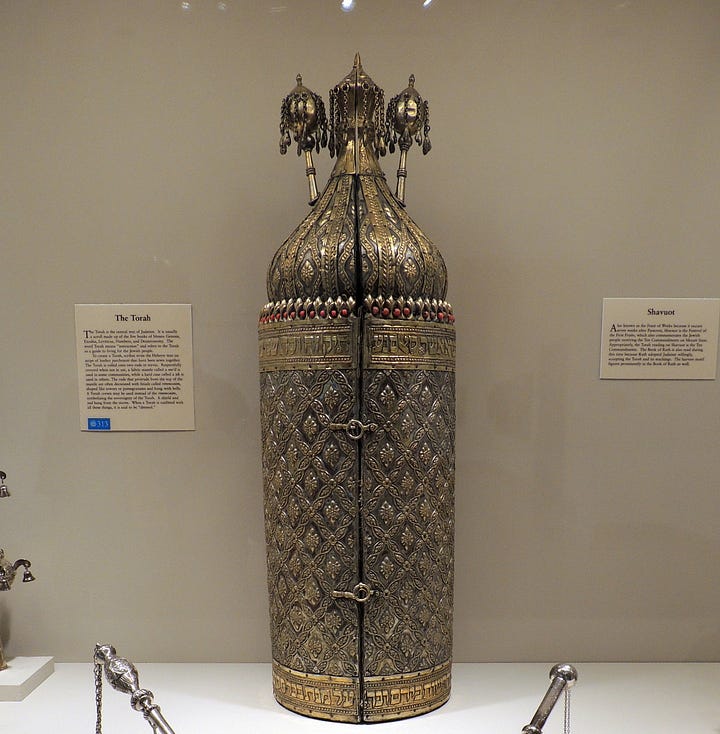
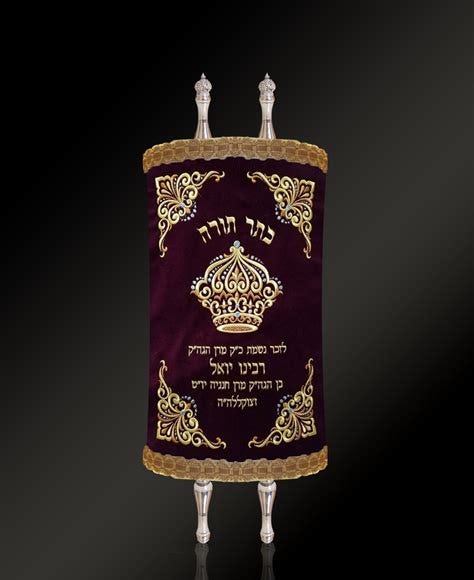
A Torah scroll doesn’t have any vowels or Jewish musical notation, so it takes special training to read directly from it. People learn to chant it from books that have the Torah printed in regular letters along with vowels and the musical notation. Usually the Torah is read in synagogue by a specially trained Reader. The portion of Prophets, the Haftorah, is read from a regular book, so it’s much easier to learn, and ordinary people sometimes read it.
The Torah is divided into portions, one for each week. Each portion is divided into seven sections called aliyot. For each section, the gabbai calls up a different man to say blessings before and after it. This is called “being called to the Torah,” or “having an aliyah.”
Many boys study two years to be ready to chant their portion, or a section of it, when they become bar mitzvah. It’s a big deal! Besides having to learn the Torah portion itself, you have to learn the blessings and all the ritual around it, plus laws about the Torah. Then you practically memorize it. After all this work, some men like to chant their bar mitzvah portion in synagogue every year.
Boys from families that don’t keep traditional laws often are called to the Torah the first time during the week. At those celebrations they’ll usually just invite their immediate family. Sometimes they just say the blessings before and after a section, or sometimes they’ll read the Haftorah.
My family’s tradition, and that of many traditionally observant families, is for the boy to be the Reader on a Sabbath. Sometimes this is just for one section, sometimes for the whole portion.
Because I live in Israel, read Hebrew well, and also like to sing, I learned to chant the whole Torah portion for my bar mitzvah. My mom said that in the USA, a lot of kids just learn their Haftorah.
Recently something special happened in our synagogue. Two weeks before his 13th birthday, a boy moved to Israel with his family and joined my class. They came from Ukraine to get away from the war there. He couldn’t even read Hebrew yet. But he became a bar mitzvah. Neither he nor his father knew the blessings or what happens when someone is called to the Torah, but they wanted to do it. The gabbai called them both up, first the father and then, for a different section, the son. The gabbai explained what to do and helped them say the blessings.
My mom doesn’t usually go to the synagogue during the week, but she had met the family and was invited. Afterwards, Mom told me that her family came from that same city as the bar mitzvah family. They had lived there for generations, but her grandfather was the only one to survive the Holocaust. She said her grandfather told her that even before the Holocaust, when Ukraine was part of the Soviet Union, practicing Judaism was not allowed.
Mom said she cried when the father was called to the Torah because she had thought Judaism must be dead in the Ukraine. She felt that only God’s hand could have brought this family out of Ukraine to Israel and put in their heads to celebrate when the son became a bar mitzvah. The parents didn’t understand much about Judaism, but they moved to Israel and vowed to live like Jews again. My classmate’s mother told my mother that as far as they knew, it was the first time since the beginning of the Soviet Union, more than 100 years ago, that anyone in their family had been called to the Torah.
Beyond Becoming Bar Mitzvah
Now that I am 13, I use tefillin when I pray in the morning. Tefillin are leather boxes with leather straps. The boxes have prayers inside. One box is worn on the forehead and the other on the upper left arm, (if you’re a righty) near the heart. Lefties wear the arm tefillin on their right arm at heart height. The tefillin strengthen our connection to God. They’re sort of like a spiritual cell tower.
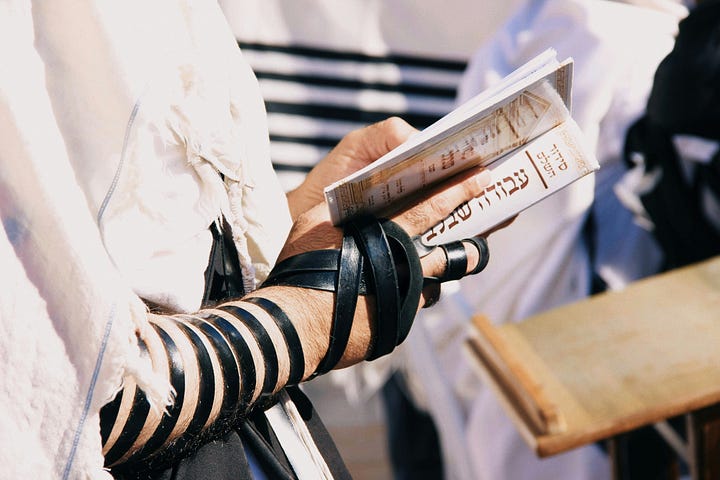
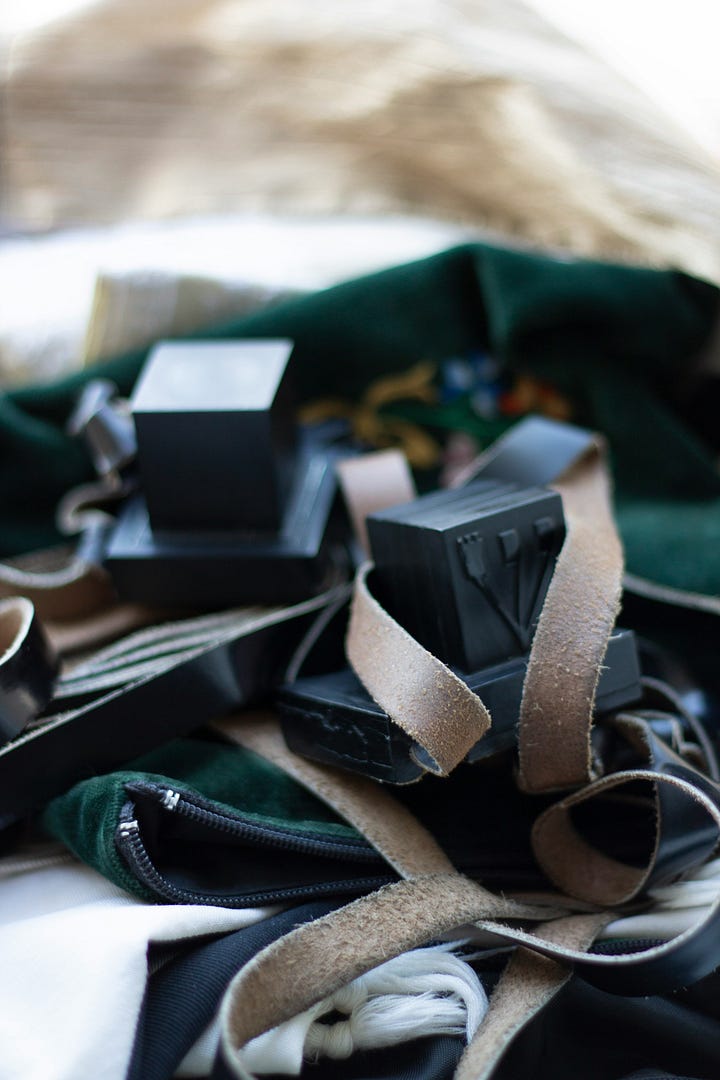
A month before my birthday I started using tefillin. It takes time to learn to put them on and take proper care of them. They feel kind of strange at first, until you get used to praying with them. I think that’s why we begin using them before we have to use them.
One thing I like is being old enough to count in a minyan. Like I said, that’s a group of ten or more Jewish men. Some prayers require a minyan, like the Kaddish, a prayer that blesses God. We say it several times during a service, but one time during the service it is said for people who have died, or whose anniversary of death is that day. The prayer helps the soul of the dead person in its journey in the afterlife, so it’s important. My dad says it helps the person who is praying, too. It gives them comfort to still do something for someone that they loved, but who is gone.
A few weeks after I became bar mitzvah, a stranger showed up in synagogue too late for morning prayers. Most of the men had already left. I was still there because some retired guys were asking questions about my dad, who was fighting with our army against Hamas in Gaza. The stranger was in town for business. It was the anniversary of his father’s death and he needed to say Kaddish. With him and me, we had ten, so he got to say the prayers in a minyan.
A couple of weeks later, the synagogue got a check for a nice bit of money, along with a note thanking us for giving him the chance to say Kaddish. Giving charity in memory of someone who died is a way to honor their soul. It gave me a good feeling to know that because I was there, this stranger was not only able to say this special prayer for his father, but also got the merit of giving charity—a donation to my synagogue in his father’s honor.
Conclusion
So as you can see, being a bar mitzvah is a process that continues. It’s not just a service and a party, like my mom says it sometimes seems to be in the USA. It’s the beginning of life as an adult religious Jew. It has responsibilities, but it also has really great things, like helping someone honor his late father.
My sister, who will be 12 in a few months, tells me I need to say something about the bat mitzvah. “Bat” means daughter. When a girl turns 12, she becomes a religious adult. But her responsibilities are very different from mine, so all I can say is that if you’re interested, maybe she’ll write to you about that another time.
Well, this letter is long. I hope you understand more about a bar mitzvah. And don’t be ashamed about asking your classmate about his. It might be very different from mine, but I bet he won’t mind talking about it.
Do you have a special ceremony when you become a religious adult? I’ll look forward to hearing about it, or about your life.
Your new friend,
Yossi
For Parents Teachers, and Others
There is so much to learn about this story that I think the best way is to give you links to more detailed information than I can include here.
Bar Mitzvah
When is a bar mitzvah and how is it celebrated? https://www.chabad.org/library/article_cdo/aid/1912609/jewish/Bar-Mitzvah-When-It-Is-and-How-to-Celebrate.htm
Entering adulthood: the bar and bat mitzvah: https://www.chabad.org/library/article_cdo/aid/259492/jewish/Entering-Adulthood.htm
Bar Mitzvah Highlights: One woman’s story about her son’s bar mitzvah: https://aish.com/48938647/
Bat Mitzvah
Why are Bar and Bat Mitzvah at 13 and 12? https://www.chabad.org/library/article_cdo/aid/2957494/jewish/Why-Are-Bar-and-Bat-Mitzvah-at-13-and-12.htm
Bat Mitzvah: What It Is and How to Celebrate https://www.chabad.org/library/article_cdo/aid/1918218/jewish/Bat-Mitzvah-What-It-Is-and-How-to-Celebrate.htm
Bat Mitzvah: Links to a variety of articles https://www.chabad.org/library/article_cdo/aid/1912582/jewish/Bat-Mitzvah.htm
Torah
What is the Torah? https://aish.com/what-is-the-torah/
What is the Purpose of the Torah? https://aish.com/48965741-3/
What is the Torah? Judaism’s sacred scroll and teachings, https://www.chabad.org/library/article_cdo/aid/1426382/jewish/Torah.htm
Is there any personal significance to “my” Torah portion? https://www.chabad.org/library/article_cdo/aid/926816/jewish/Is-there-any-significance-to-my-Torah-portion.htm
What is the Torah Portion? How the Five Books of Moses are divided up into weekly portions. https://www.myjewishlearning.com/article/what-is-the-torah-portion/
Tefillin
What Are Tefillin? https://www.chabad.org/library/article_cdo/aid/1918251/jewish/What-Are-Tefillin.htm
Tefillin: Binding mind, heart, and deed: https://www.chabad.org/library/article_cdo/aid/102436/jewish/Tefillin.htm
What are Tefillin? All about those powerful black boxes, placed on the head and arm: https://aish.com/18-tefillin-2/



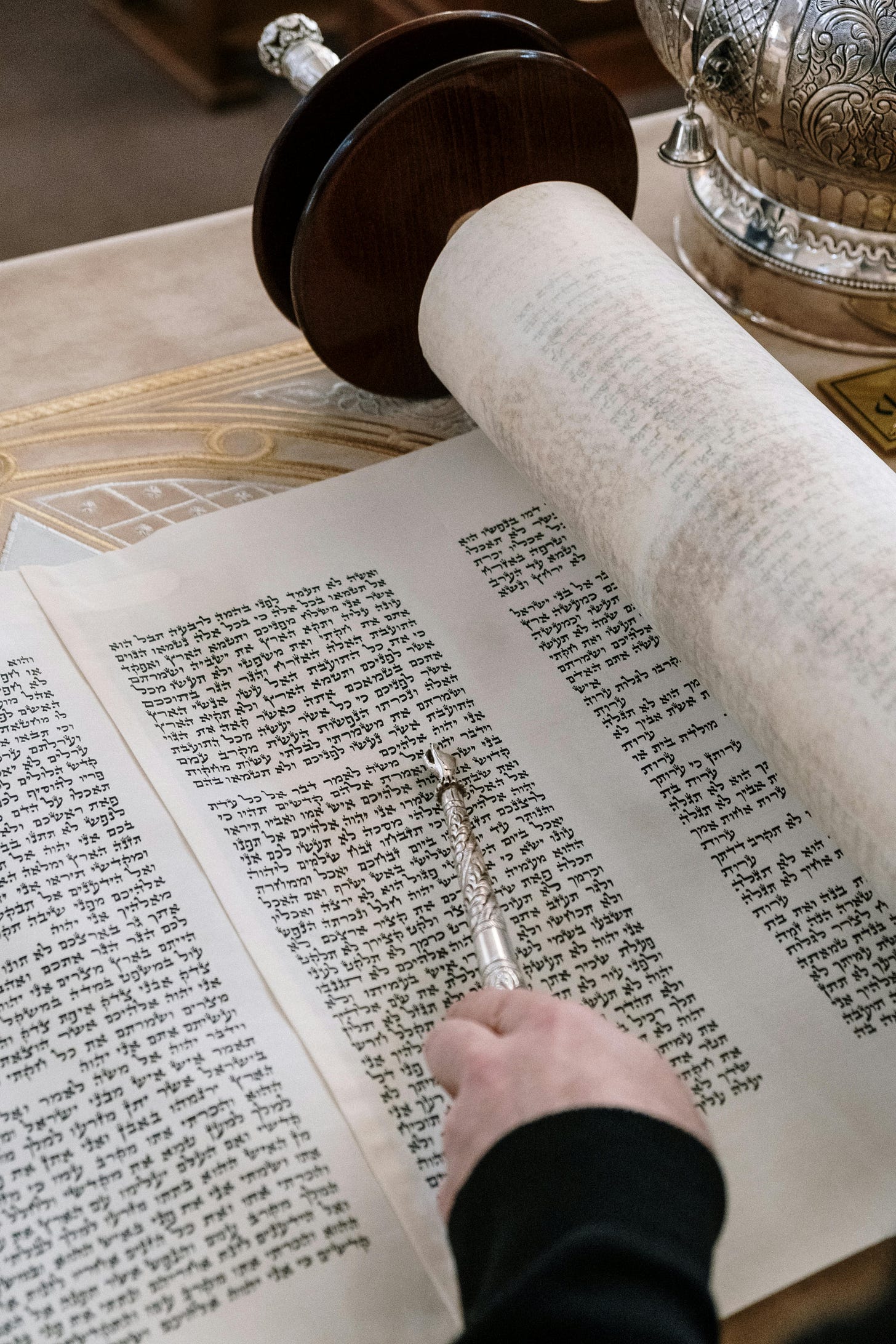
Clear and precise information presented in an engaging writing style perfect for kids and adults alike.